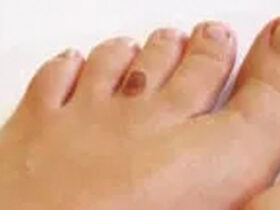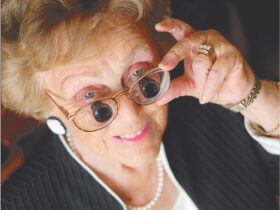 After the age of 40, it might be more difficult to see things up close like a cell phone, newspaper or menu. If it makes you feel any better, these changes in ability to focus have been occurring gradually since childhood.
After the age of 40, it might be more difficult to see things up close like a cell phone, newspaper or menu. If it makes you feel any better, these changes in ability to focus have been occurring gradually since childhood.
This inability to focus for near vision is called presbyopia and happens because the lens inside the eye becomes less flexible as we age.
“We all must adjust to these subtle changes as the years go by,” said Dr. Sarah Eccles-Brown, board-certified ophthalmologist and partner at Elmquist Eye Group. “The good news is that most normal age-related eye changes should not stop you from being active well into your golden years.”
While age-related vision changes are vexing, many are normal and generally become evident between ages 41 to 60 including:
• Need for more light. As you age, you need more light to see as well as you used to. Brighter lights, particularly for work or for reading will help.
• Difficulty reading and doing close work. Printed materials can become less clear. Reading glasses with magnification can usually fix the problem.
• Problems with glare. Changes in your lenses in your eyes cause light entering the eye to be scattered rather than focused precisely on the retina.
This creates more glare from headlights while driving or sun reflecting off windshields or pavement. Polarized sunglasses can protect from certain types of glare, your car’s visor can help, and special lenses can help reduce glare.
• Reduced tear production. With age, the tear glands in your eyes will produce fewer tears, particularly for women due to hormone changes. Your eyes may feel dry and irritated. Eye drops, ointments and humidifiers can help. Sometimes prescription eye drops and further interventions are needed.
• Seeing floaters and flashes. Occasionally, you may see spots or floaters in your eyes. In most cases, these are shadowy images of particles floating in the fluid that fills the inside of the eye. Although they can be bothersome, spots and floaters typically don’t harm vision. They are a natural part of the eye’s aging process.
However, loss of vision is not normal with aging and your risk for more serious eye problems does increase with age. See your eye care professional right away if you:
• Cannot see or everything looks blurry
• See more floaters than normal along with bright, flashing lights
• Lose peripheral or side vision, which may be a sign of glaucoma or retinal detachment
• Have cloudy vision
Many of these symptoms can also be caused by diabetic retinopathy, which affects blood vessels in the retina and is the most common cause of vision loss amount people with diabetes.
Adults over 40 who have the following health issues or work conditions may be particularly at risk for developing eye and vision problems:
• Chronic, systemic conditions such as diabetes or high blood pressure
• A family history of glaucoma or macular degeneration
• A highly visually demanding job or work in an eye-hazardous occupation
• Health conditions related to high cholesterol, thyroid, anxiety or depression, and arthritis for which you take medications. Many medications, even antihistamines, have vision-related side effects.
“While you can’t stop the aging process, you can take steps now, and throughout your life, to protect your vision,” said Eccles-Brown. “The most important step is to have a comprehensive eye examination once a year, especially after age 60, or more frequently if you have risk factors such as diabetes or family history of eye disease.”
During an exam, your eye doctor puts drops in your eyes to dilate, or widen, the pupils to get a clear view of what’s going on inside your eyes and to look for signs of eye disease, many of which are age-related.
“This is the only way to find some common eye diseases that have no early signs or symptoms,” Eccles-Brown adds. “Early detection and treatment are key to saving sight.”
Prioritize the health of your eyes as you age. Schedule a dilated eye exam today with Elmquist Eye Group’s team of highly skilled associates.
If you have concerns about your vision, it is important to speak to a doctor to discuss treatment options. With more than 25 years of service to the Southwest Florida community, Elmquist Eye Group offers experienced doctors who are dedicated to patient care. Dr. E. Trevor Elmquist, Dr. Kate Wagner, Dr. Sarah Eccles-Brown and Dr. Nina Burt of Elmquist Eye Group are available to answer your questions. With three U.S. military veterans leading the practice, rest assured knowing that Elmquist Eye Group’s team stands ready to serve you with knowledge and experience right here in Southwest Florida. For more information, visit www.Elmquist.com, call 239-936-2020 or stop by an Optical Boutique location in Fort Myers or Cape Coral.
Elmquist Eye Group
239-936-2020 | www.elmquist.com
FORT MYERS
7970 Summerlin Lakes Drive
CAPE CORAL
2336 Surfside Blvd., Suite 121









